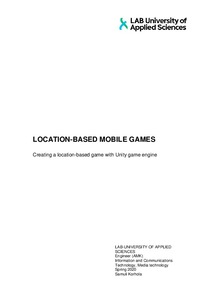The Impact of a Free-to-Play Monetization Model on Player Engagement: A Case Study of Overwatch 2
Kunelius, Konsta (2025)
Kunelius, Konsta
2025
All rights reserved. This publication is copyrighted. You may download, display and print it for Your own personal use. Commercial use is prohibited.
Julkaisun pysyvä osoite on
https://urn.fi/URN:NBN:fi:amk-202504247592
https://urn.fi/URN:NBN:fi:amk-202504247592
Tiivistelmä
Technology is evolving rapidly, and the gaming industry is constantly adapting to keep up. Different monetization models have been used to attract the interest of consumers, with free-to-play (F2P) being one of the most adopted models in today’s gaming industry. What happens when a buy-to-play (B2P) video game transitions into a F2P model? This shift raises important questions about how it might affect player engagement and whether it is a strategy that other paid games should consider, especially since many of the most popular titles today follow the F2P model.
The aim of this thesis was to understand how players experienced the shift from a B2P to F2P model in Blizzard’s video game Overwatch 2. The study examines how players interacted with the game and how they felt about the cosmetic content tied to the new monetization model. The Technology Acceptance Model (TAM) was used as the theoretical framework to help explain player behaviour and engagement. The data was collected through five semi-structured interviews with Overwatch 2 players.
From the analysis, it was found that the F2P model made the game more accessible and helped attract initial interest. However, that early excitement didn’t lead to long term engagement with most participants. Players had mixed feelings about the new monetization approach, including features like the battle pass and cosmetic content. Although some felt the system was fair and well-structured, most players found the rewards underwhelming and felt that the sense of progression had lost its meaning. Aside from monetization, gameplay changes and community factors also played a role in shaping their experience.
This research helps shed light on what keeps players engaged in F2P games and shows how important it is to align monetization with what players find valuable and rewarding.
The aim of this thesis was to understand how players experienced the shift from a B2P to F2P model in Blizzard’s video game Overwatch 2. The study examines how players interacted with the game and how they felt about the cosmetic content tied to the new monetization model. The Technology Acceptance Model (TAM) was used as the theoretical framework to help explain player behaviour and engagement. The data was collected through five semi-structured interviews with Overwatch 2 players.
From the analysis, it was found that the F2P model made the game more accessible and helped attract initial interest. However, that early excitement didn’t lead to long term engagement with most participants. Players had mixed feelings about the new monetization approach, including features like the battle pass and cosmetic content. Although some felt the system was fair and well-structured, most players found the rewards underwhelming and felt that the sense of progression had lost its meaning. Aside from monetization, gameplay changes and community factors also played a role in shaping their experience.
This research helps shed light on what keeps players engaged in F2P games and shows how important it is to align monetization with what players find valuable and rewarding.
Kokoelmat
Samankaltainen aineisto
Näytetään aineisto, joilla on samankaltaisia nimekkeitä, tekijöitä tai asiasanoja.
-
Game Development in Unity : Game Production, Game Mechanics and the Effects of Gaming
Dansie, Jason (Metropolia Ammattikorkeakoulu, 2013)The goal of this thesis is to examine how video games are designed and to see how differ-ent game mechanics work and how to use them in the development of a game, as well as examine what are both the positive and negative ... -
Location-based mobile games : creating a location-based game with the Unity game engine
Korhola, Samuli (2020)The subject of this thesis is location-based mobile games. Location-based mobile games are a way for mobile games to combine reality with virtual worlds and thus re-define the gaming experience. This thesis presents ... -
”WE WANT A 3D GAME” : Customer expectations for the games company when buying a serious game
Sorppanen, Mikko (Oulun seudun ammattikorkeakoulu, 2012)All digital games are not used for entertainment. Some of them can also be used for non-entertainment purposes and these games are called serious games. This thesis is carried out in co-operation with one Finnish games ...



